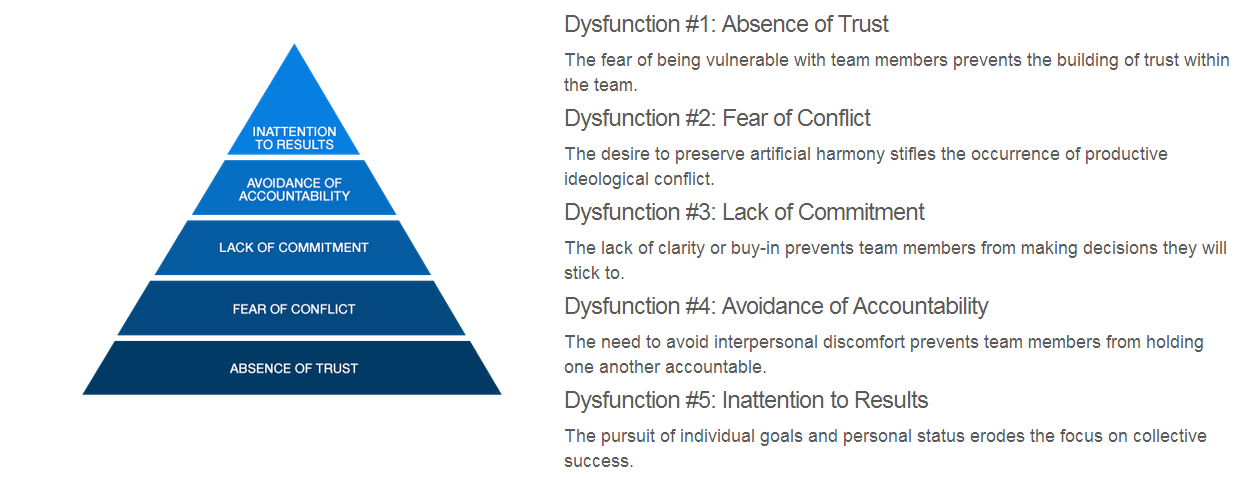The Necessity of Creating a Great Culture from the Top Down
We’ve been in high gear, here at Mavidea, planning for an event that happened on June 26. It was co-branded with Shoop Training and Consulting on the topic, Connection, Conflict and Culture. I led the culture discussion.
I’ve been thinking a lot lately about the principles shared by Patrick Lencioni in his book, The Five Dysfunctions of a Team.
Lencioni suggests if you want to create a healthy organizational culture, you must have a functional leadership team. Your leadership must be able to create clarity and support an atmosphere of trust.
Leadership in the absence of trust
What I’ve witnessed in a lot of small businesses is an actual lack of a leadership team. Or, when a leadership team is present, it’s not a very functional team.
The truth is, culture starts from the top down. So if you have a dysfunctional leadership team — or maybe a one person wrecking crew leadership team — you’re not putting yourself in a very good position to have a great culture.
Lencioni recommends that leadership teams hold quarterly strategic planning meetings. The central purpose of the meeting is to have the leadership team evaluate themselves as a group, and also, as individuals inside the group.
He suggests that leadership can benefit from understanding the five elements on this pyramid, sometimes called The Five Behaviors, or the Five Dysfunctions of a Team.
Notice at the foundation of the pyramid, and the precursor to all of the other dysfunctions, is the Absence of Trust.

In a business culture marked by a lack of trust, fear of conflict, lack of commitment, avoidance of accountability and inattention to results will always be the outcome.
Smart business vs. healthy business
So many businesses are out there trying to be smart businesses. But the healthy organization outperforms the smart business almost every time.
Your business can have all the intelligence in the world, but if you don’t have a healthy organization, you’ll never tap the full potential of the individuals on your team.
“Smart” organizations choose to focus on strategy, marketing, finance and technology. Healthy organizations maximize their focus by minimizing politics, maintaining high levels of moral, creating minimal confusion and creating low turnover.
Organizational health begets performance and trumps intelligence that cannot be fully realized.
What’s interesting is that a healthy organization will inevitably get smarter over time. That’s because motivated people are more apt to take action. They are also more likely to identify critical issues, cycle through problems and identify novel solutions.
In the smart, but culturally detached organization, the group’s “horsepower” is displaced and is difficult to engage. In comparison, healthy organizations are able to pivot quickly in response to environmental changes. They’re less likely to get stuck in the quicksand of politics, ego and dysfunctions.
Unfortunately, the vast majority of small businesses fall into the smart category. Therefore, they don’t perform as effectively as they should.
And the fault for why this happens rests with choices made by leadership.
Is a great culture possible when leadership is dysfunctional?
Sometimes a business can succeed with a dysfunctional culture. But I bet if that company’s employees were surveyed, they would find that they’re not where they need to be if the goal is to get the maximum value out of the available talent in the company.
The effect of leadership on a business is very similar to the impact a mom and dad have on a family.
In a home where parents disagree on strategic decisions, how emotionally healthy are the kids going to be?
If mom and dad are highly functional and have a great marriage full of grace and trust, won’t this become a benefit to their kids’ behavior and emotional state?
It’s the same similar situation in a business.
Great leaders and leadership teams are able set the stage for people to excel. They’re able to tap into even adequate intelligence and multiply it by many times.
People who aren’t listened to are difficult to leverage. They lose passion and the motivation to create. Performance and productivity suffers.
People who are treated with respect have the confidence to take healthy risks and to make decisions without wavering. They are able to find joy in the successes of others and freely explore opportunities to build accomplishments of their own.
These employees are active thinkers who are full of new ideas. They create the kind of energy that can help a business grow.
Trust and the foundations of organizational health.
Trust is the foundation of all of the qualities that support growth and prosperity for the individuals who make up a business – and for the business itself.
In a mirror image to the pyramid of Lencioni’s Five Dysfunctions, it’s the necessary ingredient to all that is healthy in a team’s dynamic.
To have a healthy culture, you have to start with an open and balanced approach to leadership. For the sake of your future, you have to understand who the true leaders are in your organization.
Build a leadership climate of clarity and cohesion, then get your leaders personally involved in propelling your business forward – while avoiding dysfunction and politics.
